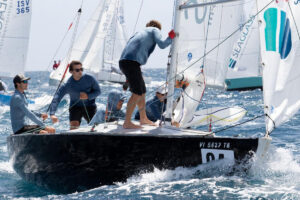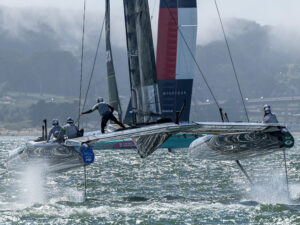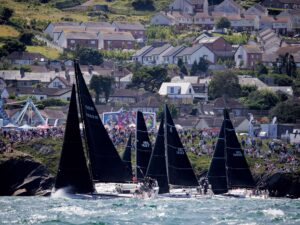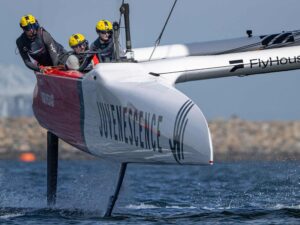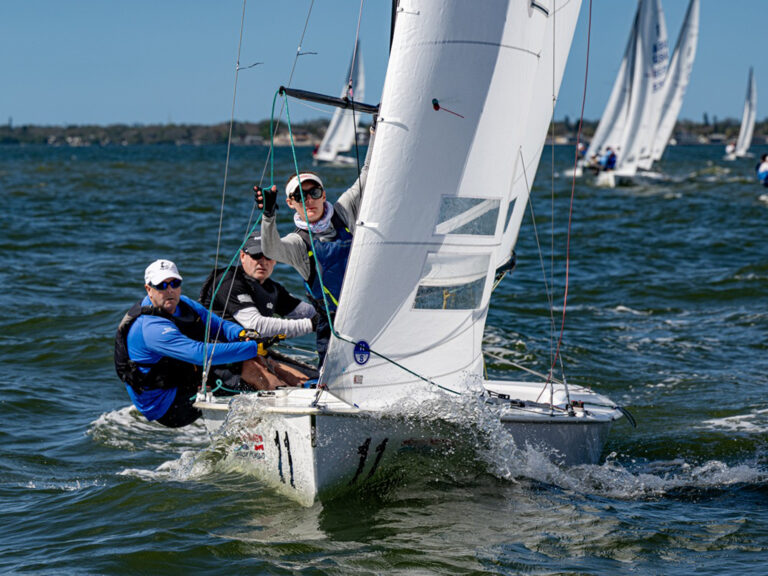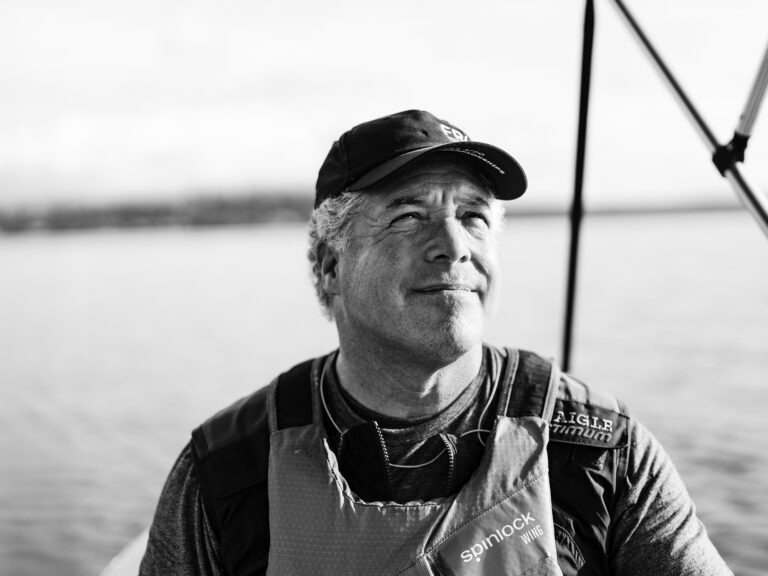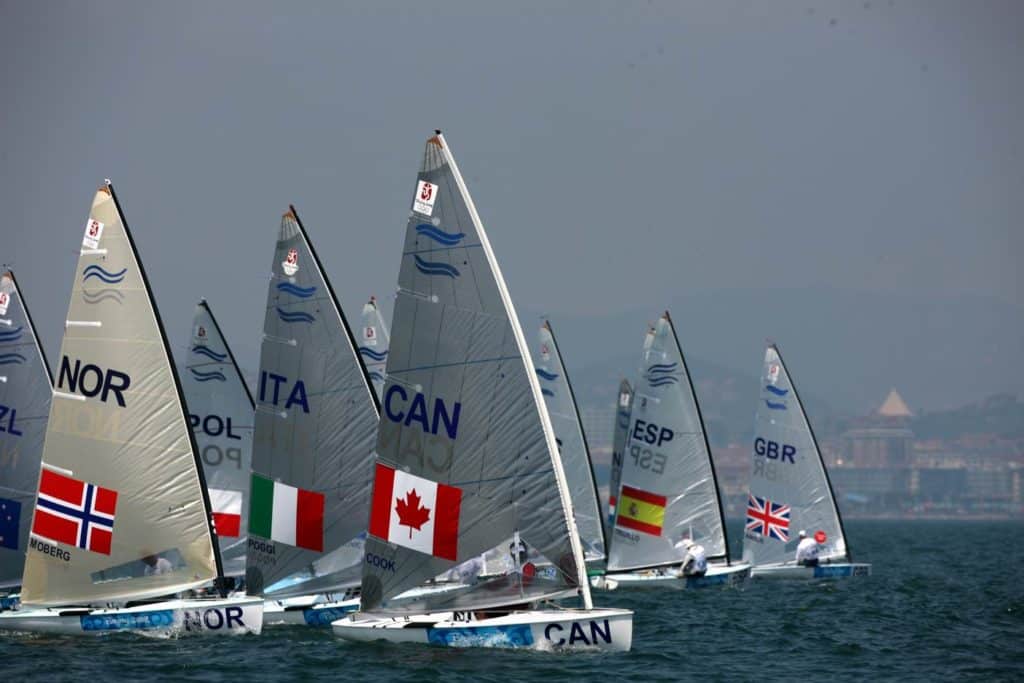
For most of the fleet it has been a long and winding road, with many pitfalls, dead ends and road works. The 23 sailors are now making final preparations for the pinnacle event in Rio. The intensity of the qualification and physical training periods is now evolving into fine tuning the details and making sure everything is ready for when the starting gun goes on August 9th.
There is not much doubt that Rio’s waters will provide perhaps the biggest challenge of the sailor’s careers. The unseen currents, the changeable winds, and the hidden dangers beneath the surface will all conspire to create a fascinating Games that even the favorite, four times World Champion Giles Scott (GBR), and favorite for the gold, is not taking for granted.
Sailors have spent longer training at the venue than at any previous Olympics, many starting three years ago to familiarize themselves with the conditions. Many have based themselves there for protracted periods to get to grips with Rio’s idiosyncrasies. Most are fully aware it won’t take much for everything to go wrong for them.
Scott has won almost everything in sight since the UK trials in 2011, when he lost to Ben Ainslie (GBR), effectively ending his chances to qualify for London 2012. Since then he has won 19 out of the 21 regattas sailed. He was clearly a cut above the rest and his smooth, almost casual style spoke volumes of an innate skill in the boat that transcended his previous training partner and mentor, Ainslie. He was bigger, stronger and fitter. He was making it look too easy.
That success was also a wake up call to the rest of the fleet. They realized that unless they started to catch up, and quickly, the gold medal in Rio was as good as gone.
But the unexpected can happen, as it did in Palma in April of this year, when an unforeseen rudder pintle breakage probably cost Scott another regatta win. The man to take advantage of that was Josh Junior (NZL), who goes into the Games as the only man in Rio with bragging rights over Scott in more than five years. It may not be much, but it is something to hold on to.
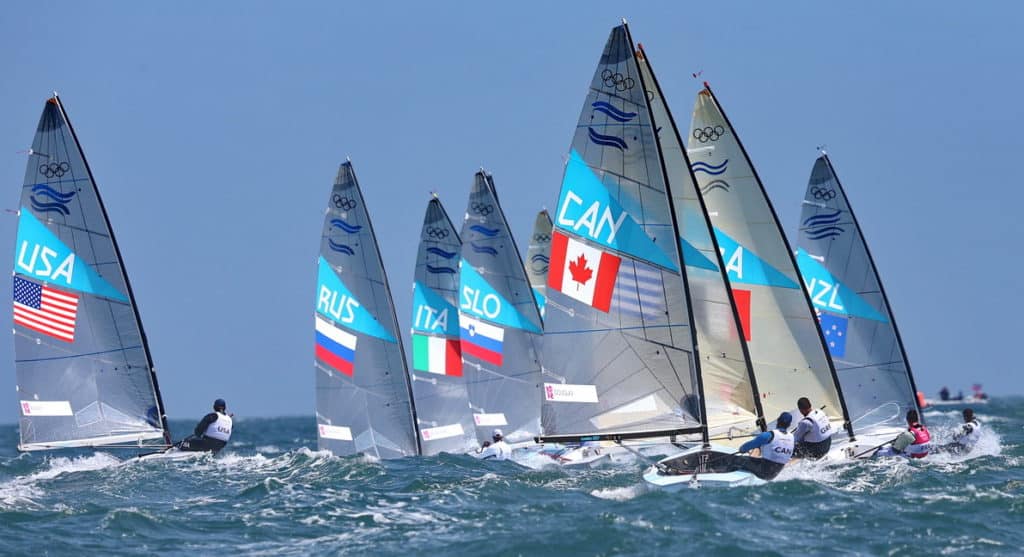
Qualification
Qualification for Rio started at the 2014 ISAF Sailing World Championships in Santander. Apart from Brazil as host nation, 12 nations qualified there: Great Britain, Croatia, France, New Zealand, USA, Norway, Sweden, Denmark, Slovenia, Australia, Hungary, and Finland. Next, China won the Asian place at the Sailing World Cup Qingdao, Netherlands, Greece, Estonia, Uruguay and Italy qualified from the 2015 Finn Gold Cup in Takapuna, Canada and Argentina won the North and South American places at the 2016 Sailing World Cup Miami, and finally at the 2016 Princess Sofia Regatta, Turkey won the final European place, with the Seychelles winning the African place. It was the most complicated and long drawn out qualification system ever used for sailing.
For a change, all those who qualified met their National criteria and were given their tickets to Rio. Of the 23, just seven are sailing their first Olympics, seven are sailing their second, five are sailing their third, two are sailing their fourth and two are sailing their fifth: Slovenia’s Vasilij Zbogar and Seychelles’ Allan Julie. Zbogar is the oldest sailor this year at 40, while the average age has dropped from 30 in 2012 to 29 in 2016.
Looking at it quantitatively, based on recent performance, about 10-12 sailors have the capacity to medal, and around 18-20 have performed well enough to make the medal race on August 16.
New Zealand’s Josh Junior is uppermost in most people’s mind as a possible foil of the great Giles Scott. He only moved into the Finn in 2013 after a failed attempt to win the NZL 2012 Laser campaign from Andrew Murdoch, who also moved into the Finn after the 2012 Games. Junior’s biggest problem used to be consistency, but having won the NZL trials against Murdoch, one of the most conservative sailors in the game, he now seems to have got that under control.
Junior has spent much of the past year training with Pieter-Jan Postma (NED), perhaps the most flamboyant, risk taking sailor in the fleet. The partnership has clearly clicked though as both sailors have benefitted from working together. Postma, who finished fourth in London 2012, has lurked near the top for years, but always failed to convert potential to gold. That changed in 2014 with his first major victory at the Hyeres World Cup, but it took another two years before he would win his first title, the 2016 European Championship.
Of the 23 sailors in Rio, only 11 sailed the Finn at London 2012, including two of the medallists, Jonas Høgh-Christensen (DEN) and Jonathan Lobert (FRA).
After winning silver in London, and narrowly missing the gold, Høgh-Christensen stepped away from Finn sailing for two years. He returned in the summer of 2014 to qualify Denmark in Santander, though was still unsure whether he wanted to do another Olympic campaign. However, he didn’t take much persuading and by Palma in 2015 he had a full programme running, culminating in a second place at this year’s Finn Gold Cup.
In contrast, Lobert never stopped. However it took him another three years to win his first major championship medal, silver at the Finn Gold Cup in Takapuna in 2015. Lobert is part of the group that has probably spent more time in Rio than any other. Together with Max Salminen (SWE) and Tapio Nirkko (FIN) the group should know Rio’s conditions well enough, but have sacrificed that knowledge against regatta experience.
Other experienced sailors taking part include three-time European champion Ivan Kljakovic Gaspic (CRO), third time Olympian, Deniss Karpak (EST), and for the second time Giorgio Poggi (ITA).
Of the new young group sailing their first Olympics, Jake Lilley (AUS) is perhaps one of the brightest stars. He towers over most of the fleet and has been steadily rising through the ranks over the past three years and could pose a threat at the front. Caleb Paine (USA) and Anders Pedersen (NOR) are equally promising and are both capable of a result. In contrast, Tom Ramshaw (CAN) has spent less than a year in the boat, but has achieved some phenomenal results in that short time. If these sailors continue progressing at the same rate, they are going to be the front-runners in Tokyo, but could also surprise in Rio.
One of the success stories of the last cycle has been the establishment of the Dinghy Academy in Valencia. That success is reflected in the number of sailors based there that qualified for Rio, or have used it as a training venue on their road to Rio. Nine of the 23 sailors have benefitted from Luca Devoti’s experience and training methods including Zsombor Berecz (HUN), who won silver at this year’s Europeans and double Olympic Laser medallist Vasilij Zbogar (SLO), back for his second Olympics in the Finn. In addition, two of those sailors – Facundo Olezza (ARG) and Alejandro Foglia (URU) – have also been directly funded through the Finn class development programme to train in Valencia. Together with 2012 World Champion, Jorge Zarif (BRA), the Finn class has three sailors from South America for the first time since 1968.
The fleet is rounded out with the 2012 European Champion, Ioannis MItakis (GRE), Alican Kaynar (TUR) and Lei Gong (CHN), all back for the second time,
However, what all the sailors are saying, whatever their past results would otherwise indicate, is that this will be an Olympics where past form means very little. They all agree that these Games will be very tough to manage, and very difficult to predict, and to win you have to be the best all round sailor – and perhaps a little lucky.

